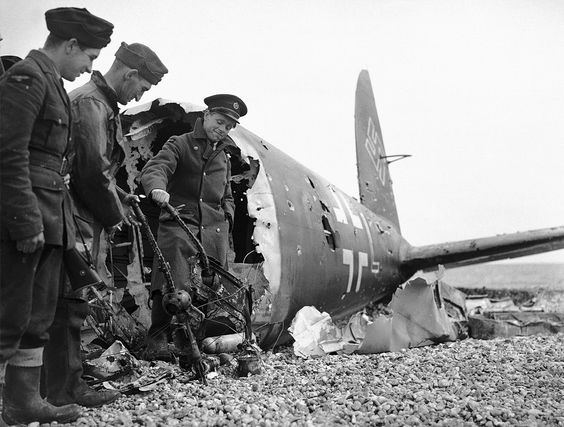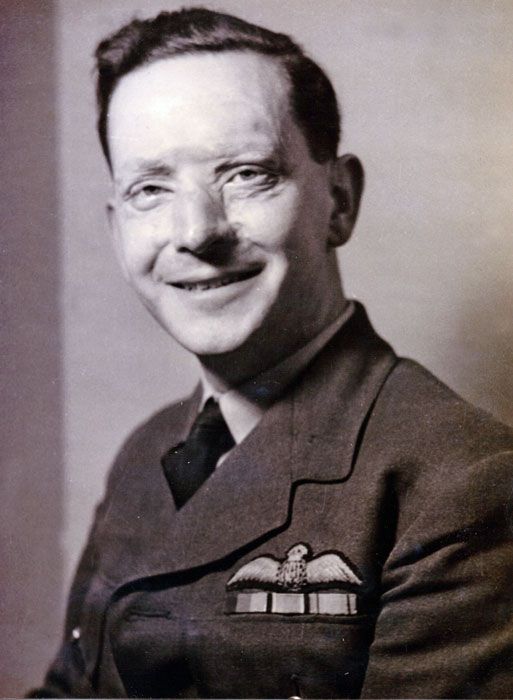Saturday 13 July 1940
 |
| A Heinkel He 111 KG27 (1G+L-) that crashed on the English southeast coast, July 13 1940.You can see the bullet holes and damage to the machine guns. |
During the day, British figures show 3 Hurricanes lost and 6-9 Luftwaffe fighters and 6-8 Luftwaffe bombers. The RAF has three pilots killed. Many Luftwaffe pilots shot down over the Channel are being rescued by the highly efficient German rescue teams, even in the mouth of the Thames.
Loss figures are highly political, difficult to verify and vary substantially from source to source. This is not due to poor research, but due to such factors as incomplete and imprecise records, definitional issues (is a "badly damaged" fighter which makes it back to base a loss?), and so forth. One thing is certain, the RAF is getting a lot of planes in the air, with 449 sorties.
Hitler is still setting the agenda for the Battle of Britain. He meets with Goering, Army Commander-in-chief von Brauchitsch, and other top commanders at the Berghof and tentatively decides on 5 August as the beginning of the full air offensive against England, followed by a possible invasion - Operation Sealion - depending upon how air operations go.
While Hitler's start date is three weeks away, Goering must hurry to get his force ready. The main issue is that the Luftwaffe is neither suited for a strategic operation nor has its planes efficiently dispersed at its forward bases for an air offensive. Bases themselves must be prepared. Instead, many of the elite fighter squadrons remain in Germany, resting and refitting, while the Luftwaffe's bomber force is inadequate no matter where it is based.
General der Artillerie Franz Halder (the Army Chief of Staff) presents detailed planning proposals that outline an operation incorporating 39 divisions and around 500,000 men (published 20 July) to land on the southern coast near Brighton. Hitler still does not feel an invasion will be necessary due to a British capitulation but authorizes some half-hearted preparations such as barge collection at the Channel ports.
The RAF stages bombing raids on several North German ports (Hamburg, Bremen, Wilhelmshaven, and Emden) and various airfields throughout occupied Europe. Also targeted are munitions depots at Harlingen and Bruges.
RAF Squadron No. 302 officially formed. It is composed of 13 Polish airmen flying Hurricane fighters - of much higher quality than anything they had available in defending their own country.
 |
| P/O William Tower-Perkins joins RAF No 238 Squadron Middle Wallop on 13 July 1940. |
German raider Widder, 200 miles northeast of Antigua, sinks 5228-ton British freighter King John in the middle of the North Atlantic. The raider rescues five crewmen and makes them POWs, and also takes aboard 21 survivors of the Panamanian ship Santa Margarita which was sunk by U-29 on 2 July. The Widder is overloaded with prisoners, so some 100 are given lifeboats and allowed to row to nearby islands.
The Dutch vessel Kertosono, previously taken by the German raider Thor, arrives in Lorient, France with its prize crew.
Convoy OB 183 departs from Liverpool.
Battle of the Mediterranean: The Regia Aeronautica attacks Royal Navy aircraft carrier HMS Eagle. The Eagle responds by launching Sea Gladiators which soot down three of the attacking Italian bombers.
There is an air raid alert at 05:45, but it is just an Italian fighter sweep. At 22:10, there is a bomber raid, with bombs dropped on a flying boat base at Marsaxlokk, on Marsamxetto Harbor, and on Zeltun.
Pilot Officer Burges, who flies a Gladiator in defense of Malta, is awarded the DFC for having shot down six aircraft. His citation:
Although normally a flying boat pilot, and only transferred to fighter duties since the commencement of war with Italy, Flight Lieutenant Burges has shot down three enemy aircraft and so damaged three more that they probably failed to reach their base. He has shown great tenacity and determination in seeking combat, usually in the face of superior machines.The authorities on the island ban private cars without a special permit. This includes taxis. The government suggests using the bus.
 |
| Pilots of (Polish) No 302 Squadron RAF at RAF Leconfield in October 1940. |
North Africa: Italian land forces attack the British base at Moyale, Kenya, which is staging a determined resistance against land and air assault.
The Italian Regia Aeronautica raids the British base at Sidi Barrani.
The RAF raids El Aden, El Gubbi, Bardia, and Tobruk.
Peace Talks: German Foreign Minister Ribbentrop, in an extremely rare direct communication with a British government official, cables the Duke of Windsor in Lisbon and states that "Hitler wants peace with England. Hold yourself ready for future developments." The Duke of Windsor and American wife have met Hitler and are considered, if not overtly pro-Hitler or pro-German, at least holding some sympathy with the Hitler regime. However, the Germans vastly over-estimate the extent of such feelings, if any. The Duke is in Lisbon for transport to his new posting as Governor of the Bahamas.
 |
| P/O Ernest D "Dave" Glaser peeks back from Spitfire Mk I YT-F at RAF Hornchurch after joining No 65 Squadron RAF on 13 July 1940. |
Japanese Military: Admiral Kichisaburo Nomura receives a top award, being awarded the Grand Cordon of the Order of the Sacred Treasure.
US Military: The USS Wichita (CA 45) and USS Quincy (CA 39) reach Santos, Brazil on their "show the flag" mission.
German Government: At his meeting at the Berghof, Hitler offhandedly mentions that the UK is only fighting on because of the looming presence of the Soviet Union. While not making any official plans, he suggests that it may first be necessary to eliminate this threat to the German rear to enable a successful prosecution of the war against Great Britain. This is not a frivolous initiative on Ribbentrop's part, because Hitler is said to be extremely confused by England's failure either to respond to previous peace feelers or initiate some of its own.
 |
| A New York Times map comparing Hitler's conquests with Napoleon's. |
Holocaust: Taking an unusual and successful route to escape German repression, 40 Jewish refugees arrive in San Francisco on the Tatsuta Maru.
Luxembourg: German teacher Damian Kratzenberg, a professor at the Athénée de Luxembourg, organizes the Volksdeutsche Bewegung (VdB) in Luxembourg City. Its mission is to foster Hitlerism in the populace. The organization uses the standard German phrase Heim ins Reich (roughly, ""Back into the Fatherland").
Italian Homefront: The fascist regime receives reports that some Italians are not taking the war sufficiently seriously and are using the blackouts as an excuse for romantic endeavors that are not designed to aid the war effort. They begin issuing regulations banning certain such activities.
British Homefront: British housewives donate piles of aluminum pots as requested to aid in the construction of new fighters.
Future History: Patrick Stewart is born in Mirfield, England. He becomes an acclaimed actor in the 1970s, perhaps best known for his iconic role of Captain Picard on the '80s/'90s television series "Star Trek: The Next Generation."
Paul Prudhomme is born in Opelousas, LA. He becomes a celebrity chef in New Orleans late in the 20th Century with a specialty in cajun cooking.
 |
| The New Yorker, 13 July 1940, showing a campaign stop by the Republican ticket. |
 |
| Colliers, July 13, 1940. Cover illustration by Robert O. Reid. |
July 1940
July 1, 1940: Vichy France
July 2, 1940: Arandora Star
July 3, 1940: Operation Catapult at Mers El Kébir
July 4, 1940: Romania In Crisis
July 5, 1940: The Five Freedoms
July 6, 1940: Hitler's High Point
July 7 1940: Dakar And Ringo
July 8, 1940: Tea Rationing in England
July 9, 1940: Battle of Calabria
July 10, 1940: Battle of Britain Begins
July 11, 1940: "Nous, Philippe Petain"
July 12, 1940: Enter Laval
July 13, 1940: German Surface Raiders Attack!
July 14, 1940: Bastille/Mourning Day
July 15, 1940: Tallest Man Dies
July 16, 1940: Plans for Sea Lion
July 17, 1940: Burma Road Closed
July 18, 1940: FDR Runs Again
July 19, 1940: Last Appeal To Reason
July 20, 1940: First Night Fighter Victory
July 21, 1940: Soviets Absorb Baltic States
July 22, 1940: First RAF Night Fighter Victory
July 23, 1940: Invasion False Alarm
July 24, 1940: The Meknés Incident
July 25, 1940: Black Thursday for RAF
July 26, 1940: Capture The Duke?
July 27, 1940: What's Up, Doc?
July 28, 1940: Destroyers Pulled From Dover
July 29, 1940: Barbarossa On The Burner
July 30, 1940: Hitler Delays Sealion
July 31, 1940: Bloody Wednesday of Olkusz
2020
No comments:
Post a Comment